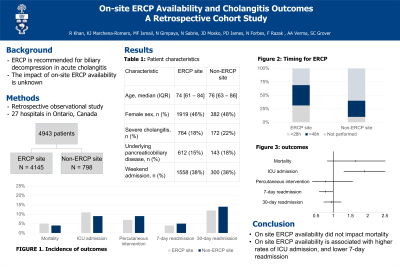Tuesday Poster Session
Category: Biliary/Pancreas
P2873 - On-Site ERCP Availability Does Not Impact Cholangitis Outcomes: A Retrospective Cohort Study
Tuesday, October 24, 2023
10:30 AM - 4:00 PM PT
Location: Exhibit Hall

- RK
Rishad Khan, MD
University of Toronto
Toronto, ON, Canada
Presenting Author(s)
Rishad Khan, MD1, Kayley-Jasmin Marchena-Romero, MSc2, Marwa Ismail, MSc1, Nikko Gimpaya, MEd1, Nasruddin Sabrie, MD1, Jeffrey Mosko, MD, MSc1, Paul James, MD, MSc1, Nauzer Forbes, MD, MSc3, Fahad Razak, MD, MSc1, Amol Verma, MD, MPhil1, Samir Grover, MD, MEd1
1University of Toronto, Toronto, ON, Canada; 2Unity Health Toronto, Toronto, ON, Canada; 3University of Calgary, Calgary, AB, Canada
Introduction: ERCP is a key component acute cholangitis (AC) management but is not available at all hospitals. The impact of on-site ERCP availability on cholangitis outcomes unknown.
Methods: In this cohort study, we included adults diagnosed with acute cholangitis at 27 hospitals in Ontario through the GEMINI collaborative. We collected data on demographics, clinical and laboratory values, and interventions. The primary outcome was in-hospital mortality. Secondary outcomes were length of stay, intensive care unit (ICU) admission, readmission rates, and requirement for percutaneous or surgical decompression. We used multivariable regression analyses to assess the impact of on-site ERCP availability on the primary and secondary outcomes, adjusting for demographics, comorbidities, severity of initial disease, and underlying hepatopancreaticobiliary (HPB) malignancy. We performed subgroup analyses on patients with HPB malignancy and severe cholangitis.
Results: There were 4943 patients in our cohort (3942 at ERCP site, 1001 at non-ERCP site). The median age was 74, 15% had underlying HPB malignancy, and 19% had severe cholangitis. In hospital mortality was 4%. On-site ERCP availability did not impact in-hospital mortality (odds ratio (OR)=1.08,95%CI=0.73-1.59) or any secondary outcomes. In the subgroup analysis, severe AC patients at ERCP-sites had lower odds of ICU admission (OR=0.36,95% CI=0.14-0.94) and 7-day readmission (OR=0.46,95%CI=0.23-0.92).
Discussion: On-site ERCP availability did not impact in-hospital mortality. For patients with severe cholangitis, on-site ERCP availability was associated with lower odds of ICU admission and 7-day readmission. While these results should be interpreted cautiously, patients with severe AC may warrant early consultation with a hepatobiliary endoscopist.

Disclosures:
Rishad Khan, MD1, Kayley-Jasmin Marchena-Romero, MSc2, Marwa Ismail, MSc1, Nikko Gimpaya, MEd1, Nasruddin Sabrie, MD1, Jeffrey Mosko, MD, MSc1, Paul James, MD, MSc1, Nauzer Forbes, MD, MSc3, Fahad Razak, MD, MSc1, Amol Verma, MD, MPhil1, Samir Grover, MD, MEd1. P2873 - On-Site ERCP Availability Does Not Impact Cholangitis Outcomes: A Retrospective Cohort Study, ACG 2023 Annual Scientific Meeting Abstracts. Vancouver, BC, Canada: American College of Gastroenterology.
1University of Toronto, Toronto, ON, Canada; 2Unity Health Toronto, Toronto, ON, Canada; 3University of Calgary, Calgary, AB, Canada
Introduction: ERCP is a key component acute cholangitis (AC) management but is not available at all hospitals. The impact of on-site ERCP availability on cholangitis outcomes unknown.
Methods: In this cohort study, we included adults diagnosed with acute cholangitis at 27 hospitals in Ontario through the GEMINI collaborative. We collected data on demographics, clinical and laboratory values, and interventions. The primary outcome was in-hospital mortality. Secondary outcomes were length of stay, intensive care unit (ICU) admission, readmission rates, and requirement for percutaneous or surgical decompression. We used multivariable regression analyses to assess the impact of on-site ERCP availability on the primary and secondary outcomes, adjusting for demographics, comorbidities, severity of initial disease, and underlying hepatopancreaticobiliary (HPB) malignancy. We performed subgroup analyses on patients with HPB malignancy and severe cholangitis.
Results: There were 4943 patients in our cohort (3942 at ERCP site, 1001 at non-ERCP site). The median age was 74, 15% had underlying HPB malignancy, and 19% had severe cholangitis. In hospital mortality was 4%. On-site ERCP availability did not impact in-hospital mortality (odds ratio (OR)=1.08,95%CI=0.73-1.59) or any secondary outcomes. In the subgroup analysis, severe AC patients at ERCP-sites had lower odds of ICU admission (OR=0.36,95% CI=0.14-0.94) and 7-day readmission (OR=0.46,95%CI=0.23-0.92).
Discussion: On-site ERCP availability did not impact in-hospital mortality. For patients with severe cholangitis, on-site ERCP availability was associated with lower odds of ICU admission and 7-day readmission. While these results should be interpreted cautiously, patients with severe AC may warrant early consultation with a hepatobiliary endoscopist.

Figure: Figure: (A) percentage of patients with cholangitis at ERCP and non-ERCP centers who underwent ERCP during the hospitalization. (B) Among patients who underwent ERCP, percentage who underwent ERCP in <24h, between 24-48h, and >48h after admission.
Disclosures:
Rishad Khan indicated no relevant financial relationships.
Kayley-Jasmin Marchena-Romero indicated no relevant financial relationships.
Marwa Ismail indicated no relevant financial relationships.
Nikko Gimpaya indicated no relevant financial relationships.
Nasruddin Sabrie indicated no relevant financial relationships.
Jeffrey Mosko indicated no relevant financial relationships.
Paul James indicated no relevant financial relationships.
Nauzer Forbes: AstraZeneca – Personal fees. Boston Scientific – Personal fees. Pentax Medical – Grant/Research Support, Personal fees.
Fahad Razak indicated no relevant financial relationships.
Amol Verma indicated no relevant financial relationships.
Samir Grover: Abbvie – Grant/Research Support, Personal fees. Ferring Pharmaceuticals – Grant/Research Support, Personal fees. Janssen – Grant/Research Support. Takeda – Personal fees. Volo Healthcare – Stock-privately held company.
Rishad Khan, MD1, Kayley-Jasmin Marchena-Romero, MSc2, Marwa Ismail, MSc1, Nikko Gimpaya, MEd1, Nasruddin Sabrie, MD1, Jeffrey Mosko, MD, MSc1, Paul James, MD, MSc1, Nauzer Forbes, MD, MSc3, Fahad Razak, MD, MSc1, Amol Verma, MD, MPhil1, Samir Grover, MD, MEd1. P2873 - On-Site ERCP Availability Does Not Impact Cholangitis Outcomes: A Retrospective Cohort Study, ACG 2023 Annual Scientific Meeting Abstracts. Vancouver, BC, Canada: American College of Gastroenterology.
